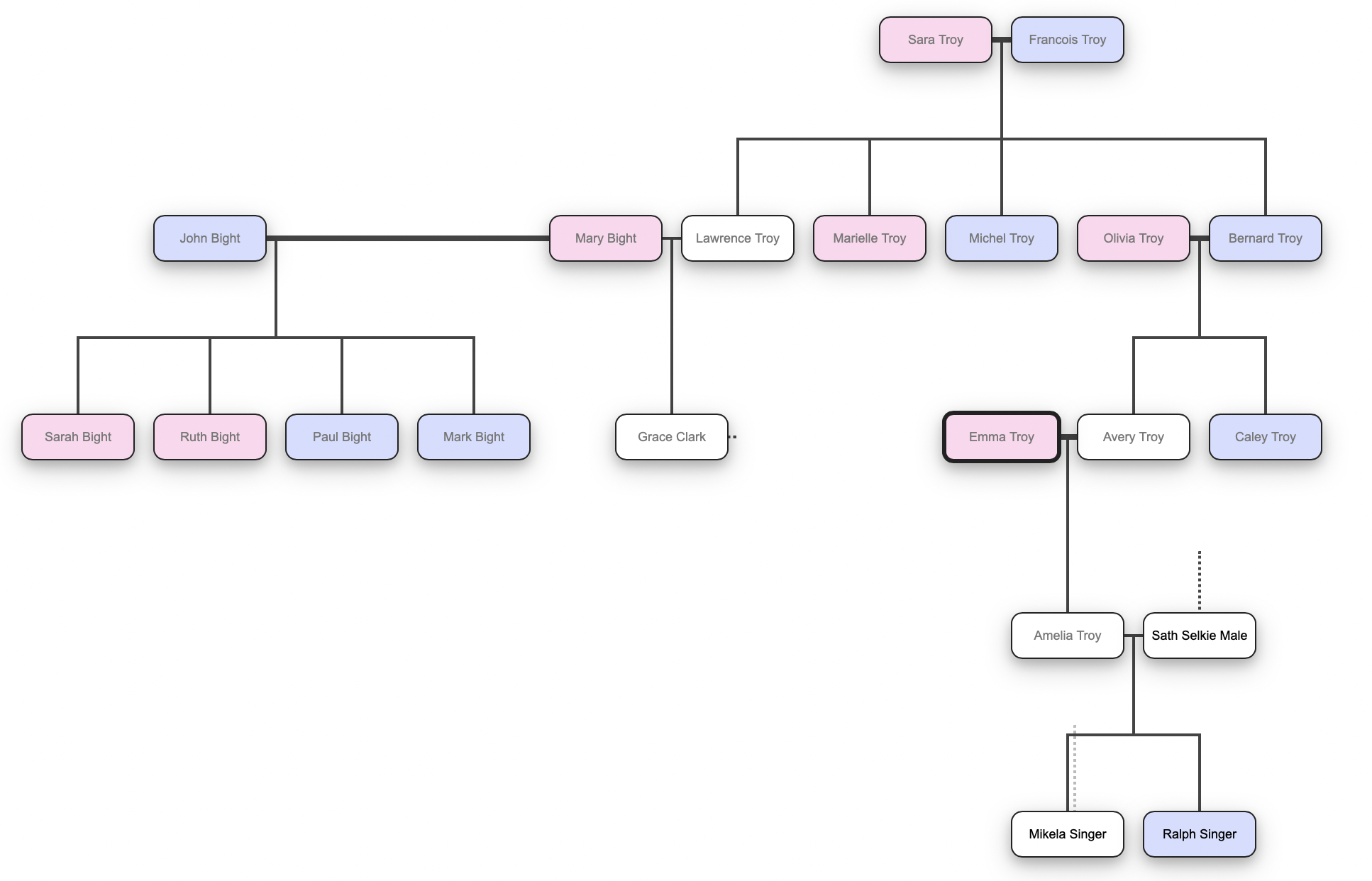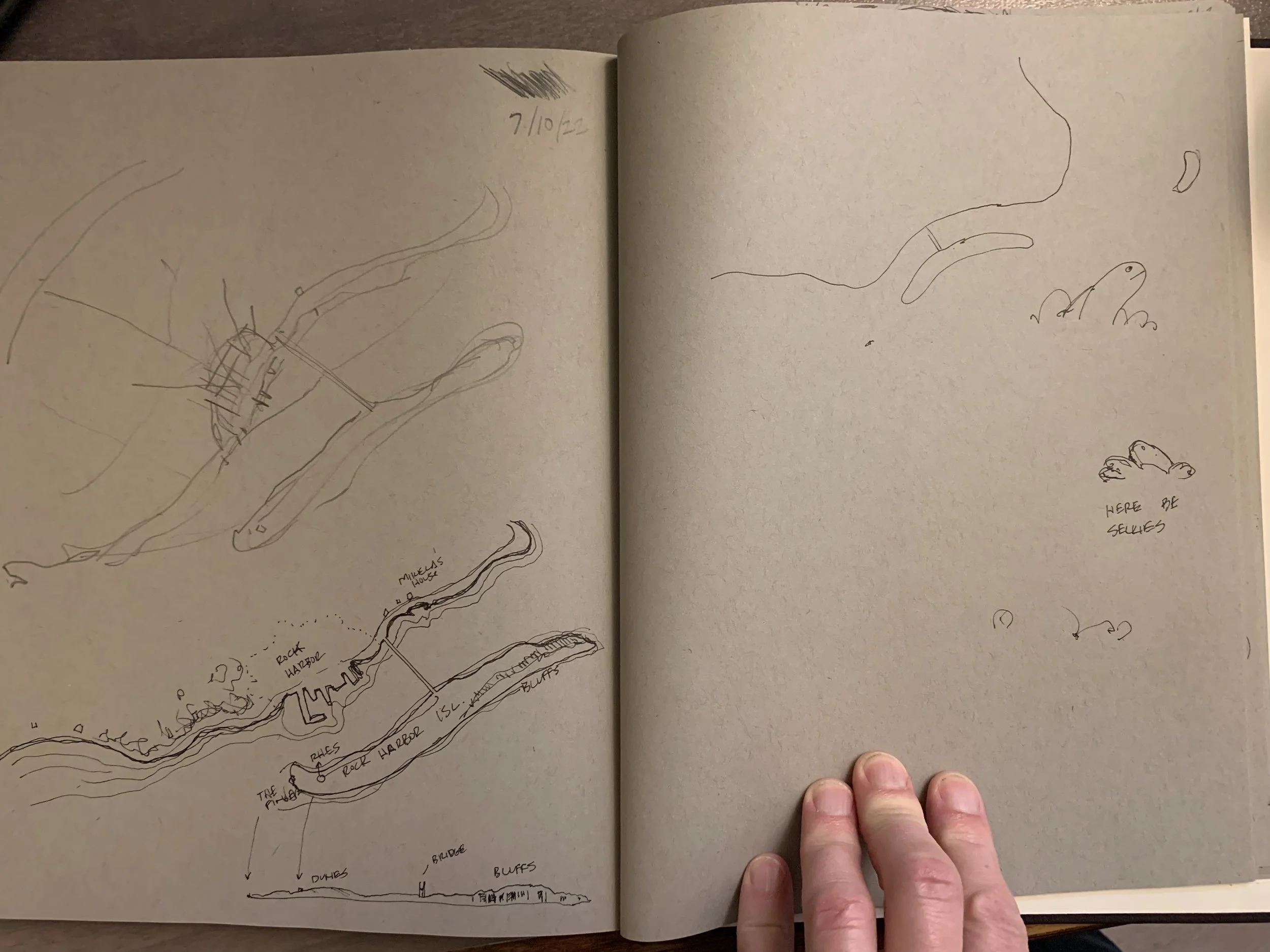Hey friends!
I’m still here, noodling around. Mostly I’m working on a novel. Without explaining too much about it:
The novel will be using (very loosely) the connective web around A Pattern Language to structure how different chapters/passages get tied into each other. That’s what this drawing was all about.
Mapping a Pattern Language, 2020
It’s set in a fictional town called Rock Harbor and the legend of the selkie is a through line of the novel. The story is multigenerational, so I’m doing some family mapping.
And lately I’ve been mapping out what Rock Harbor (one of the main settings) actually looks like.
I’ll include here a passage, a story within a story, that one of the characters finds in a local library.
Sea Shanties and Ghost Tales: an Anthropological Treatise on Maine Maritime Myth
By Charles Demuth, Esq.
Chapter 18: Selkies in Downeast
1888, Rock Harbor
In March of 1888, Lawrence Troy, a Sailor attached to the ship Bright Horizon, was ashore for a fortnight while the ship’s riggings were being mended down at Hawke’s Shipbuilders. Most times the Bright Horizon anchored in the bay, it was just long enough to unload catches and load fresh provisions, but a few times a year, work more in the nature of repairs was deemed necessary, and this was one such occasion.
Now on shorter shore leaves, young Larry would do what most sailors did, which was to wreck himself in one of the many dockside bars that catered to his sort, but during the longer periods ashore, he had a woman north of the village by the name of Mary Bight, whom he would visit.
Mary herself was the wife of a captain named John Bight, whose ship went much further than the local fisher boats or clippers used for messenger service to ports south, like Boston and New Bedford. So Mary was often alone, and young Lawrence could quite easily take the woods way uphill to High Street, where her house sat by the pond, the Widow’s Peak overlooking the village and the bay. Larry would slip in through the servant’s entrance, up the back stair to the Master Bedroom, where Mary waited. We need not detail the particulars; but needless to say that this arrangement suited both Larry and Mary very much, and it went on for some years, even as Mary and Captain Bight brought five children into the world.
Four of the children were ordinary young souls, two girls and two boys - Sarah, Ruth, Paul and Mark, all with reddish-brown hair that recalled the Captain’s once bright red hair, now gone grey.
The fifth and youngest child was a girl named Grace. She had a big head of curly blonde hair, green eyes and a round face that, in a small village like Rock Harbor, made clear for anyone to see her true parentage lay not with the Captain but with the young sailor.
This tale would perhaps be in the mold of so many others, a story of infidelity and its aftermath, if it were not for the sudden disappearance of young Larry and Grace one fine spring day in early March.
For the Troys were an old family in Downeast, long working in the fishing trade, rarely if ever straying from Rock Harbor. An old family but not a reputable one. For as long as anyone could remember, the Troys had a propensity for sudden disappearances and equally sudden and mysterious returns, years later, in the worst of weather, showing up naked ashore without a boat in sight.
The Troys mostly stuck to themselves, and when asked about the oddness of their comings and goings, would keep their silence. About as talkative as stones, some of them.
Young Larry had been the first of the Troys in living memory to woo anyone in town. The Troy spouses typically came and went without so much as an explanation for where they came from and where they were going.
Now March 1888, Grace was then fourteen years old. Larry still came to see Mary oftentimes, but after Grace was born, he began to come in through the front, as the Captain and his wife’s invited guest. There was much speculation in Rock Harbor Village about this arrangement. The Captain was too important and wealthy a figure in town to challenge, but it was clear that the manner of living he had chosen, in accommodating adulterers in his home, was not the correct way of things.
Things can go two ways in a village like Rock Harbor. Either a scandal results in the besmirchment of all concerned, or for reasons only known to themselves, the townsfolk decide, without even really any debate, that the particulars of the unusual situation are just going to be accommodated without further comment, and then the arrangment simply becomes a part of the local landscape - not discussed, and all conversation around the subject swiftly redirected.
The good, honest folk of Rock Harbor had decided in favor of the second option, being the simplest and most expedient. Gossip is quite a natural thing in a small village, but in coastal communities it competes with the naturally taciturn nature of fisher folk, so in truth the thing could have gone either way. Whatever the reasons, Rock Harbor had, since Grace’s birth, pretended not to notice the bright flaxen hair or green eyes that marked her so obviously of Troy blood.
What your faithful narrator tells you now comes from several reliable sources who were present on the morning of March 14th of that year.
That morning was sunny and clear, having been the day after a blizzard hit all of New England, which was later called “The Great White Hurricane”. The winds and surf during the storm had been strong enough to knock over boat houses at the piers, and several boats took damage.
So when Larry Troy and Grace Bight were seen coming down out of the woods to step onto the north road out of the village, Larry still in his fisherman’s gear, and Grace in the tan work apron she used when gardening, there were not a few folk out in the village, repairing shutters and windows, or drawing boats up onto the sand to fix masts, and there were a few work crews puzzling over how to pull the boat houses back together with the parts remaining to them.
All of this is to say that there was an audience.
One reliable witness has told this narrator that the pair looked as if in a spell. They walked with purpose, without speaking, holding hands, bright green eyes only on the road north. Both were barefoot. And Larry was missing his cap.
One could spin a romantic yarn around their departure as the father finally come to claim his daughter. Indeed, some have, and in some tellings of this tale that’s how the story ends. You may have heard the most common telling: that the two stepped into Larry’s little punt and rowed off into the fog, and were seen years later settled in Nova Scotia, out of Bridgewater.
There is also a version that goes something like this: Captain Bight rode on horseback to cut them off north of the village, and killed the both of them. It’s a popular enough tale; being one that taps into folks’ not incorrect belief that with power comes abuse of the common people.
The truth, as told to this narrator, is stranger.
For the odd couple’s behavior was so disturbing that most of the townsfolk present followed them north. In the wintry aftermath of the storm, Larry and Grace walked at an even, slow pace, their bare feet crunching in the wet snow, but they seemed not to notice the cold.
There were quiet, unsettled murmurs as the village folk followed, bundled up in their coats and scarves and mittens, but mostly those present were as quiet as those they trailed behind.
A mile north of the village, Larry and Grace turned into the little cove that sits in front of what is today the Harris house, but back then belonged to the Wyatts. The sky was bright against the rolling sea as they walked down to the shoreline, their bare feet pushing through the snow into the black sand. Grey seals swam about in the cove, as they often did, it being a natural shelter, but when Larry and Grace put their feet into the surf, the seals all seemed to swim closer. The ones on rocky ledges dove in to follow the others.
The father and daughter walked straight into the water.
Up to their knees.
Up to their waists.
Up to their chests.
Up to their necks.
They walked straight in until their heads were completely submerged, and then they were gone, with only the circling seals remaining, and the gulls diving and darting above.
Why, you might ask, why didn’t anyone rescue them?
It is, dear reader, a perfectly sensible question, if this were the only time in the history of Rock Harbor that folks have been Called to the sea.
But it isn’t.
And it isn’t the end of the story, either.
On November 14, 1898, after the Portland Gale, a farmhand by the name of Glenn Fontine came south to Rock Harbor on horseback, on his weekly trip to purchase sundries from the general store. On the way he found a woman, wrapped in seaweed and braken, laying naked on the very same black sand beach where Larry and Grace had disappeared some ten years before.
Glenn found one of the Wyatt boys, and together they carried the woman up into the Wyatt house and laid her out on the guest bed. She was alive, to be certain, but not aware of the world around her. Her skin was pickled all over, with a mottled grey color that over the course of the day began to fade, as if her blood were warming and the skin tinged ever pinker.
The natural and first conclusion, if you hadn’t heard the beginning of this tale, might be that the poor woman was a shipwreck survivor.
Those do happen from time to time, though less often than you hear in stories. Once in a long decade you might have survivors from a wreck swim to shore alone; most commonly, though, survivors come in on dinghies and life boats.
You have to take into account that this was after a November double storm, a blizzard and hurricane. The water was frigid. No one survives the sea in those conditions.
Except the woman who washed ashore that cold November day.
It wasn’t until Mrs. Wyatt arrived - she came hurrying home from the village at the news - that a name was put to the young woman.
For ten years before, Mrs. Wyatt had seen this woman - who now laid on a bed in her own home - walk into the sea.
The woman was Grace Bight, no doubt, but no longer a girl now. Her hair was long, tangled about her, as if it had never been combed, and there was seaweed wrapped about her head almost like a scarf. The woman’s face was unmistakeable.
Mrs. Wyatt cleaned Grace up as best as she could, dressed her in one of her own nightshirts, and laid her under blankets. She put her oldest daughter on watch to check in on the woman often, and then she borrowed a horse from a neighbor and rode to Machias for a doctor.
Grace slept for three solid days, seemingly needing no food or water or care, though steadily she seemed to come back to health.
On the fourth day, she opened her eyes.
Finally, hi!
Transition for me has mostly happened behind the veil of Pandemic, so a good number of you I haven’t seen in person since…geez…2019. Still transfeminine/non-binary glorious weirdness going on over here, but I’m not torn up about it these days. Just a thing.
Best,
Colleen



